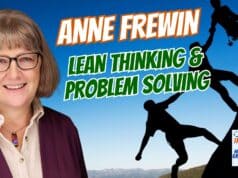Thanks as always to Ryan McCormack for this… there's always so much good reading, listening, and viewing shared here by him! Subscribe to get these directly from Ryan via email.
Insights about improvement, innovation, and leadership…
Operational Excellence, Improvement, and Innovation
Don't be a tool(head).
Many improvement professionals find themselves transitioning from being an individual contributor delivering projects to becoming an improvement coach and developing others. It's tempting to focus on training others on tools or developing a ‘belt' system, but your value as a coach has little to do with your expertise in tools and methods. Improvement coaching is more than tools and methods.
Tell a better story
Defining a problem well is an improvement superpower. To become a better problem solver, become a better storyteller.
The limits of standards
Standard work is the backbone of continuous improvement. Without an established baseline method, improvement becomes an exercise of groping around in the dark for causes and solutions. But there are limits of work standards – like everything else, it's about the people.
Solve the right problem
The world is becoming so complex that it's easy to be fatalistic and despair that your efforts to improve will never matter. Part of this exasperation is because we often approach problems like they're the same or should all be owned by leadership. Art Smalley gave us the Four Types of Problems framework to help us identify the right type, and lean leaders in Colombia are using it to help identify how to lead by solving the right problems.
Creating a Culture of Improvement
Taking care of your people is your strategy (or it probably should be)
Employee engagement has been pretty dismal for over a decade, but engagement has dropped since the pandemic, especially among younger workers, across on-site, hybrid, and fully remote workers. Meanwhile, the US unemployment rate hit its lowest rate since 1969. Your workers are less engaged and more in demand – hold on tight.
It's not business, it's personal
Have you ever thought to yourself, “I don't understand what we're so afraid of? These changes will benefit everyone”? Sometimes the root cause of resistance is historical and appears irrational in today's context. Getting to the underlying causes is essential to cultivating a mindset. Get personal about change management.
Is business strategy a war?
For decades, MBA students everywhere have been reading the Art of War by Sun Tzu, presumably to apply military wisdom to business strategy. But why is military thinking useful in business strategy? ![]() Roger Martin breaks down the 4 battle principles for business leaders on the Big Think series Explain It To Me Like I'm Smart.
Roger Martin breaks down the 4 battle principles for business leaders on the Big Think series Explain It To Me Like I'm Smart.
Brave New Work
Most of my regular readers know that I'm a fanboy of The Knowledge Project. I swear I listen to other podcasts, but TKP is so consistently insightful that I feel obligated to keep sharing. This week's podcast guest was Aaron Dignan, author of ![]() Brave New Work and founder of The Ready, shares some incredible insights on how to reinvent your organizational culture through decision-making, governance, principle-based methods, and combatting bureaucracy. Check out
Brave New Work and founder of The Ready, shares some incredible insights on how to reinvent your organizational culture through decision-making, governance, principle-based methods, and combatting bureaucracy. Check out ![]() Episode 158 of The Knowledge Project with Aaron Dignan – you won't want to pause it.
Episode 158 of The Knowledge Project with Aaron Dignan – you won't want to pause it.
Coaching – Developing Self & Others
OK – R U going to achieve this year?
It's the beginning of the calendar year and creeping up at the beginning of the new fiscal year, so naturally, everyone wants to reset their goals. There are many methods for setting corporate goals and metrics; if I may be direct, they are all terrible, but some are less terrible than others. OKRs (Objectives and Key Results) continue to be popular for setting and cascading breakthrough objectives in large organizations. I recently completed a ![]() Coursera class on OKRs – I recommend it for people seeking to learn more about how to leverage this method for (hopefully) greater alignment.
Coursera class on OKRs – I recommend it for people seeking to learn more about how to leverage this method for (hopefully) greater alignment.
Why do I say all goal-setting systems are degrees of terrible? Primarily because they say very little about how the goals are to be achieved, and when they do, the assumptions are based on false certainty and linearity. OKRs attempt to address this by establishing intermediate milestones or goals (key results) along the way, but it fails to prescribe deeper principles and methods, incenting people to achieve the key results by any means necessary. A robust management system and supporting principles are required to realize the benefits of OKRs.
“Setting goals is a guarantee for disillusionment whether we reach the desired state or not, and yet working toward goals is an important part of evolving as a person.” How should we address the paradox of goals? Feedback and growth loops rather than roadmaps and gantt charts.
As you get into goal-setting, here's my annual reminder to design your approach to avoid catastrophic consequences. Think I'm exaggerating? Let's not forget some recent examples, like the Wells Fargo Cross-Selling Scandal and the Boeing 737 Max scandal. Prioritize principles over goals as you plan for this year.
Follow Ryan & Subscribe:
LinkedIn: https://www.linkedin.com/in/rjmccormack/
Subscribe to receive these via email
Please scroll down (or click) to post a comment. Connect with me on LinkedIn.
Let’s build a culture of continuous improvement and psychological safety—together. If you're a leader aiming for lasting change (not just more projects), I help organizations:
- Engage people at all levels in sustainable improvement
- Shift from fear of mistakes to learning from them
- Apply Lean thinking in practical, people-centered ways
Interested in coaching or a keynote talk? Let’s talk.
Join me for a Lean Healthcare Accelerator Trip to Japan! Learn More









